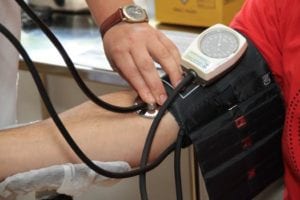Written by Harold Oster, MD. Results suggest that the daily intake of a low dose of licorice is associated with increased blood pressure and decreased levels of renin and aldosterone.
 Hypertension, which affects more than 40% of adults in the United States, is a leading risk factor for heart disease and stroke1. Licorice contains glycyrrhizic acid (GA), which in doses above 400 mg/day has been shown to increase blood pressure (BP) and suppress renin and aldosterone levels. Glycyrrhizic acid inhibits an enzyme in the kidney that breaks down cortisone. Cortisone is then able to act like aldosterone, raising blood pressure and suppressing the renin-angiotensin-aldosterone system. Because of these effects, the European Union recommends a daily intake of GA of no more than 100 mg2.
Hypertension, which affects more than 40% of adults in the United States, is a leading risk factor for heart disease and stroke1. Licorice contains glycyrrhizic acid (GA), which in doses above 400 mg/day has been shown to increase blood pressure (BP) and suppress renin and aldosterone levels. Glycyrrhizic acid inhibits an enzyme in the kidney that breaks down cortisone. Cortisone is then able to act like aldosterone, raising blood pressure and suppressing the renin-angiotensin-aldosterone system. Because of these effects, the European Union recommends a daily intake of GA of no more than 100 mg2.
Peder af Geijersrtam et al. studied the effects of a daily intake of licorice containing 100 mg of GA on blood pressure and the levels of renin and aldosterone in adults. The authors recruited fourteen males and fourteen females between eighteen and thirty years old and randomized them into two groups. After a one-week run-in period, the first group’s participants consumed licorice containing 100 mg of GA daily for two weeks, followed by a two-week washout and then two weeks of a daily control. The second group consumed the control for two weeks, followed by a two-week washout and then the licorice for two weeks. At baseline, the participants were assessed for body mass index and blood pressure, and weight measurements were repeated at the end of each study period. For the length of the study, the participants measured their blood pressure at home daily—three times in the morning and three times in the evening. At baseline and the end of the study periods, blood was tested for creatinine, electrolytes, renin, aldosterone, and N-terminal prohormone of brain natriuretic peptide (NT-ProBNP), a biomarker of congestive heart failure3.
The authors noted the following:
- All participants completed the study.
- At baseline, the mean systolic BP was 109.1, and the mean diastolic BP was 65.0.
- The mean systolic BP increased more during the intervention period than in the control period. (3.1 mm Hg vs -0.3 mm Hg)
- By day eleven of the post-intervention washout period, the systolic BP had returned to the level at the start of the intervention.
- The mean diastolic BP increased by 3.0 mm Hg during the licorice period. This increase was not significantly different from the change during the control period.
- The diastolic BP did not return to pre-intervention levels by the end of the post-licorice washout period.
- Renin and aldosterone levels fell during the intervention period compared to the control period. (-30% vs +15.8% and -45.1% vs +8.2%, respectively)
- NT-ProBNP concentration increased more during the intervention period than in the control period (204.1% vs 72.4%)
- Weight increased by 1.3% during the licorice period compared to a fall of 1.0% during the control period.
Results suggest that daily consumption of a low dose of licorice is associated with increased blood pressure and suppression of renin and aldosterone levels. The study’s limitations include its short duration and its unblinded design.
Source:af Geijerstam, Peder, Annelie Joelsson, Karin Rådholm, and Fredrik H. Nyström. “A low dose of daily licorice intake affects renin, aldosterone, and home blood pressure in a randomized crossover trial.” The American Journal of Clinical Nutrition (2024).
© 2024 The Author(s). Published by Elsevier Inc. on behalf of American Society for Nutrition. This is an open access article under the CC BY license (http://creativecommons.org/licenses/by/4.0/).
Click here to read the full text study.
Posted April 10, 2024.
Harold Oster, MD graduated from medical school in Miami, Florida in 1992 and moved to Minnesota in 2004. After more than 25 years of practicing Internal Medicine, he recently retired. Dr. Oster is especially interested in nutrition, weight management, and disease prevention. Visit his website at haroldoster.com.
- Krist AH, Davidson KW, Mangione CM, et al. Screening for Hypertension in Adults: US Preventive Services Task Force Reaffirmation Recommendation Statement. Jama. Apr 27 2021;325(16):1650-1656. doi:10.1001/jama.2021.4987
- Wahab S, Annadurai S, Abullais SS, et al. Glycyrrhiza glabra (Licorice): A Comprehensive Review on Its Phytochemistry, Biological Activities, Clinical Evidence and Toxicology. Plants (Basel). Dec 14 2021;10(12)doi:10.3390/plants10122751
- Schmitt W, Rühs H, Burghaus R, et al. NT-proBNP Qualifies as a Surrogate for Clinical End Points in Heart Failure. Clinical pharmacology and therapeutics. Aug 2021;110(2):498-507. doi:10.1002/cpt.2222
